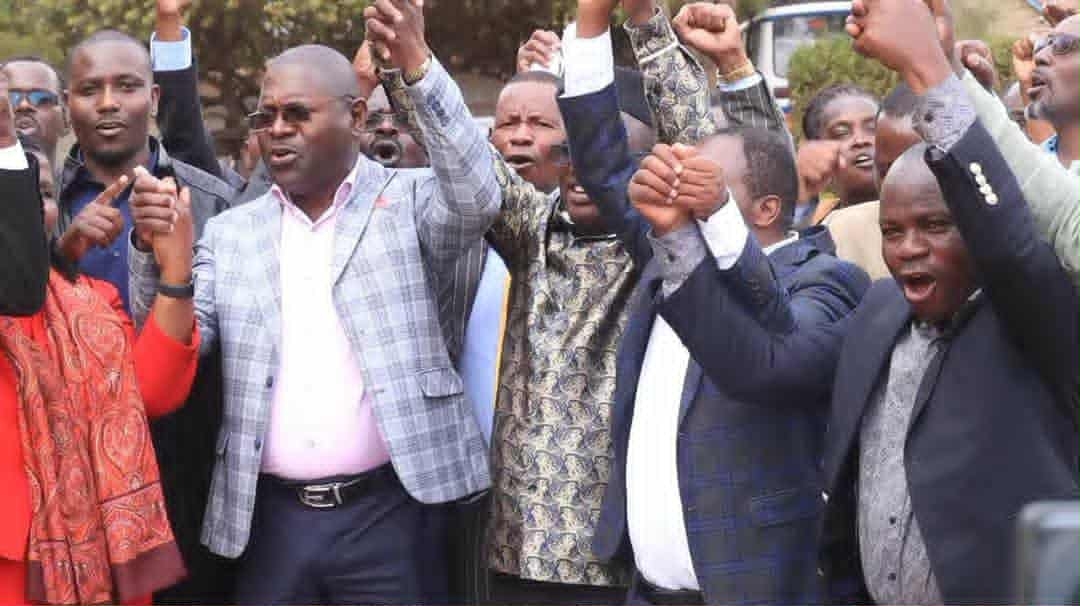The debate on the Finance Bill has highlighted the question of how far members of Parliament can be effective as a check on the executive.
Another newspaper earlier this week said “Parties should leave MPs to vote the way they wish”, adding “That way voters would feel truly represented by the man or woman they elected to do so”. But the papers were at the same time reporting that both main parties or coalitions were threatening MPs with dire consequences if they did not toe the party line on that Bill.
Last year, Waikwa Wanyoike wrote on the Elephant, “…in constitutional terms, parliament has more substantive and potent powers than those of the president.”
This highlights a paradox at the heart of our Constitution. On the one hand, it gives Parliament a crucial role, including as a check on the powers of the executive. On the other, it tries to strengthen political parties. Both are valid objectives.
A new vision of parties
The Constitution makers pinned much hope on a revitalisation of parties, not just as fan clubs for ethnic leaders.
The Constitution of Kenya Review Commission 2002 draft defined parties as “civil society organisations [with] functions of … fostering of democratic processes in government and the country and the participation of people in the political process”.
A party would mobilise public opinion, and “foster national values and outlook”. It would organise people with “similar views and interests” for political activities – like election campaigning. It would help bring public views to bear on government policies. And be a tool for holding government accountable. Finally, it would be a way of keeping discipline in the conduct of public affairs.
This attempt to describe the function of parties did not survive, but the final Constitution – retains a notion of how parties ought to be run, and what they ought not to be about.
Parties are supposed to be disciplined, efficiently run, with audited accounts – and public money for their administration. They must generally respect democratic principles, including having regular, fair and free internal elections for their governing bodies.
A party must not be based on things like ethnicity, religion or region. It would not be possible to have a woman’s party, or a Christian party, for example. The hope was undoubtedly that parties would develop into bodies based on ideology and well-thought-out approaches to government.
Parties would be particularly strengthened if Article 103(1)(e) and the Political Parties Act were fully applied. That Article says that a parliamentarian who leaves their party (crosses the floor), or who - elected as an independent – joins a party, loses their seat. The Act spells out what leads to an MP being “deemed” (regarded as) having left their party. It includes joining another party and promoting the “ideology, interests or policies” of another party.
The implications?
If carried through, would this vision moderate the “imperial presidency” so much criticised in the 1990s?
“Yes” because, if parties were really united by philosophies and programmes and not by enthusiasm for an individual, they would not be so dependent on that person. Parties would play a very different role in political life than in the past.
But if parties did not change their fundamental nature, then “No”: the dominant person (maybe the President) would arguably find a stronger party, with this floor crossing prohibition, a more effective tool to keep control over elected members.
System of government and parliament’s power
Most drafts of our Constitution involved a parliamentary system – where the Prime Minister (PM) (head of government) is the leader of the largest group in parliament, not directly elected by the voters.
In such systems, there is a risk that parliament will not be very independent-minded because of the power of the PM to exercise patronage through appointments as ministers and assistant ministers. We sometimes hear complaints about “presidential prime ministers”.
The power of a PM to call an election at any time can also be used to exercise some control over potentially unruly MPs: if they are a nuisance the PM might call an election.
Parties usually exercise considerable control over their members. For example, these are likely to be suspended or dismissed from the party if they defy a three-line whip (party direction to vote a certain way).
Powers of the PM were deliberately limited in early drafts of the Kenya constitution: ministers (or at least some of them) were to be appointed from outside parliament. And even now the Constitution limits their number (originally intended to limit the power of the PM, as well as to restrict the number of MPs focussed more on their ministries than their constituencies). The PM could not fix election dates.
On the other hand, parliamentarians and parties have some leverage over prime ministers. A formal vote of no confidence requires a simple majority only. And PMs in several countries (including in the UK and Australia) removed from office not by a vote in parliament but by a vote of the party.
But in 2010 our draft constitution was abruptly changed to a US-style presidential system. So, how independent of the President is the American Congress? Because halfway through a presidential term, there are elections for some Congress members, a president may face a hostile house.
Even otherwise, Congress members are much less constrained than MPs in parliamentary systems generally. The President often has to bargain with Congress – making concessions on proposed law, sometimes even promising advantages for key members’ constituencies (a rather corrupt practice not restricted to the US).
When that change to our Constitution draft was made, some provisions envisaged as an improvement to a parliamentary system remained. But the new version did remove a phrase about Cabinet being accountable to Parliament.
Vision of parliament as a check or balance
The Constitution introduces many functions for parliament, especially on appointments – something traceable to the US practice. Actions of the president that require (usually) National Assembly approval include many appointments, as well as declaring war (or a state of emergency for more than 14 days). The Assembly must also approve some uses of the military. These are all clearly intended as a check on the powers of others. For these to be party policy would, I suggest, be clearly unconstitutional.
The National Assembly may pass a resolution for the removal of a Cabinet Secretary for serious breach of the law or grave misconduct – and the President must then dismiss the CS.
The question of legislation and budgeting is a bit more complex. It is common for the vote on the budget to be viewed as a matter of confidence in parliamentary systems (if lost the government would resign). But in the US things are very different and Congress can amend the budget. And our Constitution involves parliament more in budget making – clearly it is not intended just to be a rubber stamp of government.
In law making the role of individual legislators has been strengthened. And parliament can force its own view on the President – by an enhanced majority – but has never done so.
Conclusion
Different provisions in our Constitution, and different aims of those provisions, may not always be easy to reconcile. With goodwill, they could be. For example, only a pattern of voting with another party, going beyond individual acts of party ‘disloyalty’, should be enough to trigger the floor crossing rule.
Our legislators tend not to take their own powers seriously. Many want to be on the winning side. Too many will accept some personal reward for supporting the government. Some do not understand their role (except perhaps the CDF).
And the party reform agenda of the Constitution has been spectacularly unsuccessful. CS Kithure Kindiki showed how true this is when he (a national government officer) tried, unconstitutionally, to interfere with a county assembly privileges committee decision.
He said that (Tuesday’s Star): “anybody who harasses a member of the ruling party harasses the President himself and that cannot be allowed”. The notion of the president as king and the party as his courtiers dies hard.






![[PHOTOS] Council of Governors visits Raila's grave](/_next/image?url=https%3A%2F%2Fcdn.radioafrica.digital%2Fimage%2F2025%2F10%2F59c8111a-6f0d-4719-8587-7e965c4bdd34.jpg&w=3840&q=100)





